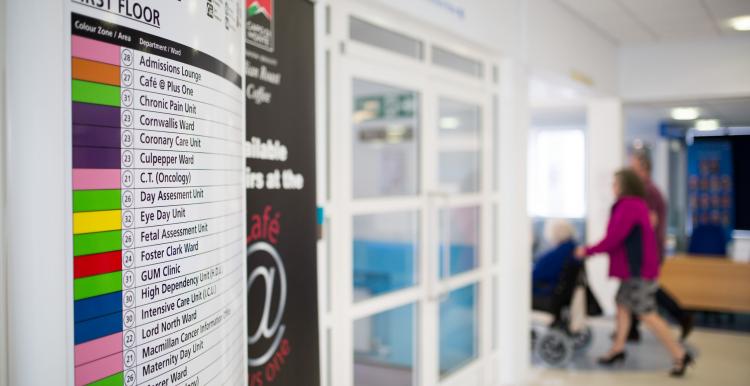Hospital discharge must be improved to manage COVID-19 second peak

Are people benefiting from faster hospital discharge?
To help hospitals free up 15,000 beds and cope with demand at the peak of the pandemic, the Government issued policy to switch to a ‘discharge to assess’ model in March 2020. This meant people were discharged from hospital faster by having their ongoing care needs assessed at home.
Local staff and volunteers from Healthwatch Cornwall, with support from the British Red Cross, carried out work to better understand the impact of emergency measures implemented earlier this year to free up beds for COVID-19 patients.
Healthwatch Cornwall carried out in-depth interviews with key staff groups involved in the discharge process in Cornwall. Alongside this, over 500 patients and carers (both paid and unpaid) across England took part in a national survey which gathered people’s experiences from late March to late August.
The public is grateful for the dedicated doctors, nurses and care staff who worked hard to save lives during the early stages of the coronavirus pandemic.
However, although the speed at which people were discharged from hospital was important, it also led to worse care and a lack of support for some patients leaving hospital.
In partnership with British Red Cross, our latest report reviews the experiences of 590 people. The research exposes where the current policy is creating gaps in care and calls on the NHS to address these issues as we enter the busy winter period amidst growing pressures of a second COVID-19 wave.
Patients felt unready to leave hospital and missed out on vital follow-up visits and assessments according to new Healthwatch and British Red Cross research into hospital discharge arrangements during the first five months of the coronavirus pandemic.
- New report shows patients grateful to hard working doctors, nurses and care staff for continuing to deliver compassionate care in difficult circumstances.
- But investigation into new hospital discharge processes shows majority of patients (82%) surveyed nationally did not receive recommended follow-up visits after discharge – and almost one in five of these reported an unmet care need.
- Healthwatch and British Red Cross say getting discharge right will play vital role in reducing readmissions and keeping hospital beds free this winter.
However, the investigation did also uncover a number of positives including increased collaboration between services and positive feedback from the public for healthcare staff working under pressure.
What people told us
Over 500 patients and carers (paid and unpaid) took part in our survey, which gathered experiences of being discharged from hospital from March to August 2020. Eight local Healthwatch and partners around the country also carried out 61 in-depth interviews with key staff groups involved in hospital discharge processes.
Key findings included:
- 82% of respondents did not receive a follow-up visit and assessment at home and almost one in five of these reported an unmet care need.
- Some people felt their discharge was rushed, with around one in five (19%) feeling unprepared to leave hospital.
- Over a third (35%) of people were not given a contact who they could get in touch with for further advice after discharge, despite this being part of the guidance.
- Overall patients and families were very positive about healthcare staff, praising their efforts during such a difficult time.
- Around a third (30%) of people faced an issue with delayed COVID-19 test results, potentially putting family and carers at risk, or in a care home, other residents and staff.
In March, hospitals were asked to discharge patients with little or no notice and the speed with which this took place was important but led to mistakes. We do not want to detract from the heroic efforts of those on the frontline, who often put themselves at great risk to care for their patients, but services and system leaders have now had more time to prepare.
“It’s essential that we learn from what people have shared with us about the impact that a poorly-handled discharge can have on them and their loved ones. Taking action now will not only reduce the risk to patients but will also help improve the way people leave hospital in the future.”
“As winter approaches and the pandemic continues, the British Red Cross is working alongside NHS and social care services to get people home safely from hospital. We’ve seen first-hand the huge efforts made to improve the discharge process for patients and their families. However, we also know despite good intentions and hard work, there are still barriers to making the ideals of discharge policy a reality.
“The Red Cross has been bearing witness to these issues for years, and we hope that the increased urgency of the situation will bring lasting change. Many of the people we support are older or more vulnerable, and fall into the higher-risk categories for Covid-19. Simple interventions, like getting equipment and medicine delivered, or follow-up visits, can make the difference between good recovery or someone regressing to the point of readmission - precisely at the time we want people to stay well, and stay at home.”
Our recommendations
To help hospitals manage a second wave of COVID-19 hospital admissions ahead of winter, we have made several recommendations based on the experiences of people and staff, including:
- Post-discharge check-ins and assessments: Services should follow policy and ensure people are offered follow-up support soon after discharge, whether by phone or in person.
- Discharge checklists: Patients should be asked about the support they need, including any transport home and equipment required.
- Communication: Patients and carers should be given a single point of contact for further support or questions, in line with national policy.
- Medication: Waiting for medication can often lead to delays being discharged from hospital. Linking patients to voluntary sector partners or community pharmacists who can deliver medicine could avoid delays.
- Boost community care capacity and recognise the value of the voluntary care sector in hospital discharge: The current discharge policy depends on follow-up assessments and care being available. Longer-term, more investment is needed to ensure this happens, including in the voluntary care sector.

